 |
|---|
|
The Ministry of Energy and Water is the government ministry responsible for energy, water, resources, mines and quarries in Lebanon.
 |
|---|
|
The Ministry of Energy and Water is the government ministry responsible for energy, water, resources, mines and quarries in Lebanon.
| | This section needs expansion. You can help by adding to it. (August 2020) |

Lebanon, officially the Republic of Lebanon, is a country in West Asia. It is bordered by Syria to the north and east, by Israel to the south, and by the Mediterranean Sea to the west. Cyprus lies a short distance away from the country's Mediterranean coastline. Lebanon's location at the crossroads of the Mediterranean Basin, between Europe and the Middle East, has contributed to the country's rich history and shaped a unique cultural identity denoted by religious diversity. Located in the Levant, the country has a population of more than five million people and covers an area of 10,452 square kilometres (4,036 sq mi), making it the second-smallest Asian country. The capital and largest city is Beirut, followed by Tripoli and Jounieh. While Arabic is the official language, French is also recognized in a formal capacity; Lebanese Arabic is the country's vernacular, though French and English play a relatively significant role in everyday life, with Modern Standard Arabic being limited to news and government matters.

Michel Naim Aoun is a Lebanese politician and former military general who served as the President of Lebanon from 31 October 2016 until 30 October 2022.

Saad El-Din Rafik Al-Hariri is a Lebanese-Saudi politician who served as the prime minister of Lebanon from 2009 to 2011 and 2016 to 2020. The son of Rafic Hariri, he founded and has been leading the Future Movement party since 2007. He is seen as "the strongest figurehead" of the March 14 Alliance.
The New South Wales Department of Planning and Environment (DPE) is a department of the New South Wales Government, responsible for effective and sustainable planning to support the growth in the state of New South Wales, Australia. It makes plans based on evidence for the state's cities and regions, working with the community, business and local government to create places for people in NSW to live, work and spend their leisure time, while ensuring good access to transport and other services like shops and restaurants. The department is also responsible for the evidence-based assessment of state significant development applications.
Muhammad Fneish is a Shia Lebanese politician and member of Hezbollah. He represented Hezbollah in the Third Cabinet of Saad Hariri, serving as the Minister of Sports and Youth.
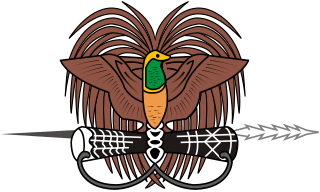
The National Executive Council (NEC), also known as the Cabinet of Papua New Guinea functions as the policy and decision-making body of the executive branch within the government system of Papua New Guinea. The Prime Minister and Ministers serve as members of the Cabinet.
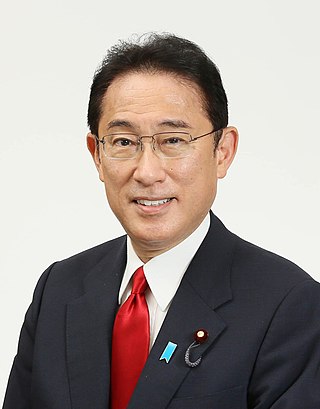
Fumio Kishida is a Japanese politician serving as prime minister of Japan and president of the Liberal Democratic Party (LDP) since 2021. A member of the House of Representatives, he previously served as Minister for Foreign Affairs from 2012 to 2017 and as acting Minister of Defense in 2017. From 2017 to 2020, he also chaired the LDP Policy Research Council.

The Cabinet of Zimbabwe is the executive body that forms the government of Zimbabwe together with the President of Zimbabwe. The Cabinet is composed of the President, the Vice-Presidents, and ministers appointed by the President. Until 1987, the Cabinet was chaired by the Prime Minister; it is now headed by the President.
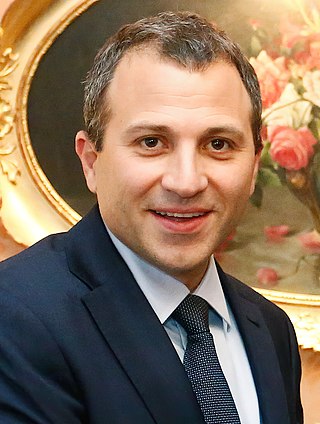
Gebran Gerge Bassil is a Lebanese politician who is the leader of the Free Patriotic Movement since 2015 and leader of the Strong Lebanon bloc in the Lebanese parliament since 2018. A Maronite Christian, he is the son-in-law of President Michel Aoun, and has been his most senior advisor since 2005.
Mohammad Safadi is a Lebanese businessman who served as minister of finance under Najib Mikati between 2011 and 2014. He was also the minister of economy and trade from 2008 to 2011.
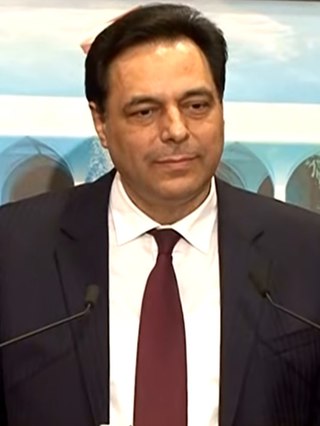
Hassan Diab is a Lebanese academic, engineer and politician who served as the prime minister of Lebanon from 21 January 2020 to 10 September 2021. He was appointed by President Michel Aoun in 2019 to succeed Saad Hariri as prime minister. He submitted his resignation on 10 August 2020 in wake of the explosion in Beirut and served as caretaker prime minister until Najib Mikati formed a new government on 10 September 2021. Prior to his premiership, he served as the minister of education from June 2011 to February 2014 under President Michel Suleiman.

Keith John Pitt is an Australian politician. He is a member of the National Party and has represented the Division of Hinkler in Queensland since the 2013 federal election. He was a member of cabinet in the Morrison government as Minister for Resources and Water and also served as an assistant minister in the Turnbull government. He was an electrical engineer and businessman before entering politics.
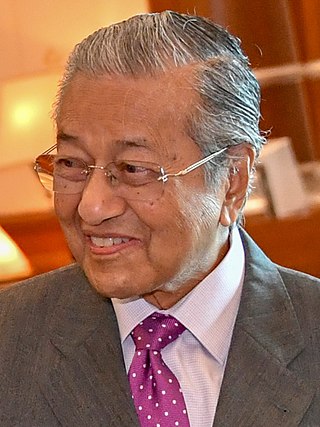
Dr. Mahathir Mohamad, being the Prime Minister of Malaysia for the second time on 10 May 2018, formed the seventh Mahathir cabinet after being invited by the Yang di-Pertuan Agong, Sultan Muhammad V to form a new government. It was the 20th cabinet of Malaysia formed since independence. Initially, he announced that the Cabinet will be composed of 10 key ministries only representing Pakatan Harapan parties, i.e. Malaysian United Indigenous Party (BERSATU), People's Justice Party (PKR), Democratic Action Party (DAP) and National Trust Party (AMANAH), as he suggested "to being a small Cabinet" rather than to have "a huge Cabinet". Then, on 21 May 2018, that list has expanded by 13 ministries. On 2 July 2018, 13 Ministers and 23 Deputy Ministers took office. It was a cabinet of 28 ministers until their fall on 24 February 2020 following Mahathir's resignation.

The second Morrison ministry was the 72nd ministry of the Australian Government. It was led by Prime Minister Scott Morrison. The second Morrison ministry succeeded the first Morrison ministry following the 2019 Australian federal election. The ministry was announced on 26 May 2019 and was sworn in on 29 May. Following the Coalition's defeat at the 2022 election, the ministry was succeeded by the Albanese ministry on 23 May 2022.

The 17 October Protests, commonly referred to as the 17 October Revolution are a series of civil protests in Lebanon that began after the Lebanese cabinet announced financial measures on 17 October 2019. These national protests were triggered by planned taxes on gasoline, tobacco, and VoIP calls on applications such as WhatsApp, but quickly expanding into a country-wide condemnation of sectarian rule, the stagnation of the economy, unemployment, endemic corruption in the public sector, legislation that was perceived to shield the ruling class from accountability and failures of the government to provide basic services such as electricity, water, and sanitation.

In Lebanon, the worldwide pandemic of coronavirus disease 2019 (COVID-19) caused by severe acute respiratory syndrome coronavirus 2 has resulted in 1,238,552 confirmed cases and 10,936 all-time deaths after COVID-19 was confirmed to have reached Lebanon in February 2020.

On 4 August 2020, a large amount of ammonium nitrate stored at the Port of Beirut in the capital city of Lebanon exploded, causing at least 218 deaths, 7,000 injuries, and US$15 billion in property damage, as well as leaving an estimated 300,000 people homeless. A cargo of 2,750 tonnes of the substance had been stored in a warehouse without proper safety measures for the previous six years after having been confiscated by Lebanese authorities from the abandoned ship MV Rhosus. The explosion was preceded by a fire in the same warehouse.
Raymond Ghajar is a Lebanese politician. He served as Minister of Energy and Water in the cabinet of Hassan Diab from 21 January 2020 to 10 September 2021. On 10 August 2020, the entire cabinet resigned and will serve in a caretaker capacity until a new government is formed.

The Horgan ministry was the combined Cabinet that governed British Columbia from July 18, 2017, to November 18, 2022. It was chaired by the 36th premier of British Columbia, John Horgan. The Cabinet was made up of members of the British Columbia New Democratic Party (NDP), which commands a majority in the Legislative Assembly of British Columbia.